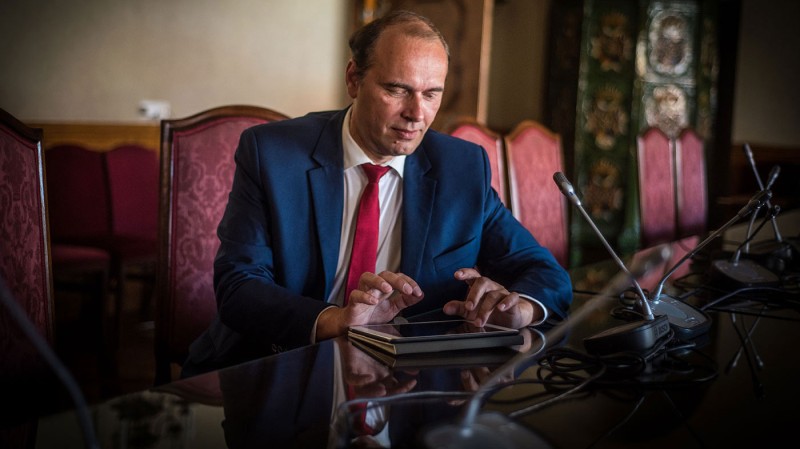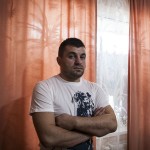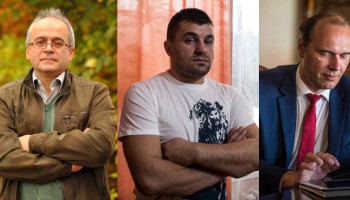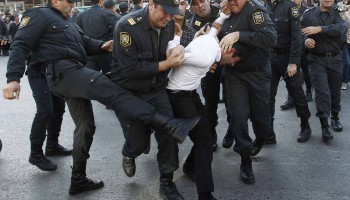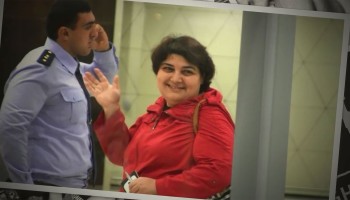Twice in his life, Libor Michalek has blown the whistle on major corruption. Both times felt like a nightmare.
But he came out of those battles as the winner. Now corrupt officials who dare to throw the first punch against this veteran whistleblower will find him throwing the last.
So beware of Libor Michalek. Thanks to his tenacity, Czechs voted him into the country’s Senate in 2012.
His first time blowing the whistle went almost unnoticed. It was the nineties -- just a few years since the fall of Communism -- and exposing corruption publically was something the media weren’t quite sure how to handle.
Michalek was then working for the National Property Fund (NPF), a government institution in charge of state assets, where he noticed an embezzlement scheme called “tunneling.” This is a type of financial fraud in which assets and profits are unlawfully transferred out of firms into the pockets of those who control them. The scheme he revealed was worth billions of Czech crowns.
“I remember exactly the date and time,” Michalek said. “On March 8, 1996, I wrote a letter to the director of the NPF in which I criticized the practice.”
Initially, the head of the body seemed interested in what Michalek had revealed in his seven-page letter. But then he did nothing about it.
“It took me about two months to realize that nothing would happen,” the 50-year-old economist told OCCRP. “Once I did, I asked journalists to write about it.” In late May, 1996, the daily DNES published an article about the fraud, but the only consequence was that Michalek was fired for “gross violation of labour discipline.”
He challenged his firing in court, but the trial dragged on for almost a year -- and according to Czech legislation, he couldn’t be employed anywhere else during that time.
“It was a tough year,” he remembered. “We had two little children and no chance to cover our basic needs without our parents’ help.”
In the end, the court ruled in his favor and Michalek got his job back. Not long afterwards, he switched to another institution before being offered in 2010 a prestigious job at the State Environmental Fund (SEF), which manages state funds meant to improve the country’s environment.
But only after a couple of months of working there, he did it again. This time, his revelations caused an earthquake.
The State Environmental Fund affair is still one of the biggest corruption scandals in recent Czech history, and has cost a numerous officials their positions.
“An advisor to the environment minister and his colleagues were finding ways to make a profit off of the subsidy system, off of public procurement, and from the process of depositing state money in private banks,” Michalek explained.
Michalek himself was pressed by his supervisors to sign a dubious agreement about the construction of a wastewater treatment plant in Prague. During the public tender, Michalek’s superiors selected a company that had overcharged the state for some three billion Czech crowns (US $138 million) -- money from which the supervisors intended to profit.
He refused, and started carefully collecting evidence that he planned, once again, to turn over to the media. By his own admission, he was scared.
“If they found out that I was recording the meetings…,” he began, but never finished the sentence. He couldn’t imagine what they would have done to him.
But once he dropped the bomb, “the situation changed,” he said. “I was fine because I knew that it was pointless for my enemies to harm me.”
Michalek also claimed that, at the SEF, contracts for legal advice and other services were being overpriced by a total of some 10 million euros ($13 million).
On the tape he leaked, the environment minister at the time, Pavel Drobil, could be heard instructing a subordinate to destroy documents implicating senior officials.
Drobil signed a termination of employment order for Michalek, but the revelations in the media developed so quickly that his order never reached the whistleblower.
Public pressure forced the contract sides to change the pre-arranged terms of the wastewater treatment plant contract, leaving both the company and Michalek’s supervisors without the personal profits they had tried to arrange for themselves.
Drobil was forced to resign, despite having the support of the Prime Minister Petr Necas and president Vaclav Klaus.
Then the head of police resigned too, after he was accused of leaking information about the investigation to Michalek’s supervisors, who were implicated in the case.
The whole government barely survived a non-confidence vote -- and Michalek kept his job.
“The new leadership of the State Environmental Fund was too scared to fire me, because that would have attracted even more media interest,” he says.
Although this time Michalek saw the corrupt heads roll as a consequence of his revelations, the affair was no bed of roses for him or his family. They were put under police protection after receiving threats, and, though some politicians, financial experts, and editors stood up for him, other outlets tried to discredit him both privately and professionally.
Nevertheless, he insists that he’d do the same thing a third time -- and as many times as he can after that.
The Czech Pirate Party, the Greens and the Christian Democrats nominated Libor Michalek their candidate for the Czech senate in the 2012 elections. His reputation as a fighter against corruption helped him win 75 percent of the votes - the best result of any politician in the Czech Republic.
“I think that whistleblowing is not something you can learn,” he told OCCRP. “Most people get only one opportunity in a lifetime to reveal some serious infringement. Either they step back from it or they become known, and then only fair employers are interested in hiring them,” he said.
His advice to those who find themselves facing the dilemma is to do what he did.
“Do not allow bad things to happen,” he said.
“The problem of the world is not the power of the evil but the weakness of the good.”
This project is part of the Global Anti-Corruption Consortium, a collaborative effort between OCCRP and Transparency International to fight corruption by combining investigative journalism and grassroots activism.
